Food fest whets Expo appetite
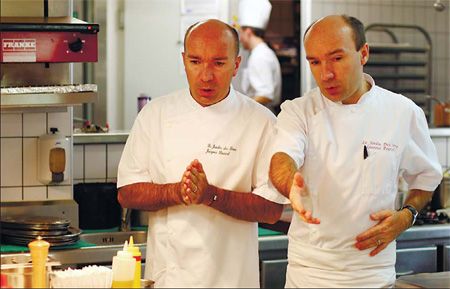 |
| The Pourcel brothers at the France Pavilion. |
National cuisines, celebrity and Michelin-star chefs are making the Expo a foodies' delight.
Celebrity chefs from Europe, soy sauce-flavored ice cream from Japan and Scandinavian seafood served in an aqua-themed restaurant, are just some of the reasons why global cuisine inside the Expo Garden is worth splashing out on.
The France Pavilion is marking the comeback of Shanghai's beloved Pourcel brothers, both of whom are Michelin two-star chefs, at its 6SENS restaurant. The restaurant has 300 different types of wine and spills out onto a breathtaking rooftop garden overlooking Parisian-style hanging gardens.
The twins, Jacques and Laurent, formerly ran a restaurant in the city and are planning to launch their next project, Maison Pourcel, somewhere inside the former French Concession in June. Sebastien Bonnefoi, the former mixologist at local Bund landmark, Bar Rouge, provides cocktails and bartending services at the French Pavilion.
"The idea in the beginning was to make a really gastronomic restaurant serving 100-150 people a day, but now we're up to 400 because so many people want to eat here," said Yoan Valette, the restaurant's general manager.
"Most of the guests (80 percent of whom are Chinese) say they come here because of the Pourcels. They're really stars in Asia. This is like their comeback," he said. The restaurant changes its menu daily and offers new concoctions like crme brulee with green tea.
Down the road at the Portugal Pavilion, celebrity chef Bruno Magro flashes his ability to dance between different cultures by cooking up traditional pig's ear salads and roast duck rice.
Brazil is also scoring points with its seared beef skewers cooked up by a celebrated chef from Sao Paulo.
About 40 national pavilions have what Expo organizers call "high-class" restaurants or cafeterias inside, but more are expected to join the list as applications for food licenses keep pouring in, a spokesperson from the Shanghai Expo Bureau's Commercial Services Department told Exposure this week.
According to World Expo regulations, each pavilion can use 20 percent of its space for commercial purposes, such as selling food and souvenirs. Although much of the pavilion food is expensive by Shanghai standards, leading many Chinese visitors to bring packed lunches, it is reasonable by theme park and public attraction standards.
Seafood lovers can tuck into a four-course meal, including marinated scallops with dill and applesauce, or pan-fried king crab, for less than 300 yuan at the Norway Pavilion.
At night, customers can bask under a light show replicating the country's famed celestial shower, known as the Northern Lights.
"This is the only Norwegian seafood restaurant in Shanghai, so we are getting more and more local Scandinavian expats coming here just to eat," said manager Mia Svartling. The restaurant has blue-tinted windows to echo its underwater theme.
"Norwegian salmon is most popular in China, but now we're opening their eyes to other kinds of fish, and they're surprised how good it is." The restaurant imports 95 percent of its fish and ingredients from Norway.
While some visitors have taken to the expensive sashimi and weird flavors on offer at the Japan Corporate Pavilion's MURASAKI restaurant and Asakusa ice-cream house, others prefer Greenopolis, Romania's apple-shaped pavilion and the only building in Expo Garden that has a food theme.
"This food is very strong, it will toughen you up," said chef Florin Mihalache, recommending the beef soup and eggplant salad. "We use different condiments than Chinese food so it's a new experience."
Not everyone was convinced, however. "It's not as flavorsome here as in Romania," said Ye Zhun, who worked in the country for three years and speaks the language. "I ate at the Turkish Pavilion instead."
Many more people have been devouring the Pakistan Pavilion's halal dishes of rice and chicken, which cost 35 yuan on average and are perhaps closer to home for many Chinese.
Halal dictates that animals be slaughtered in a humane manner in accordance with Islamic law, meaning that pork is off the menu.
Chef Zeeshan Aziz said the pavilion is getting 5,000 customers a day, 10 times the number seen at the neighboring India Pavilion. The Pakistan Pavilion's lobby is constantly swarming with people eating or being sold on local rugs and porcelain at its market stalls.
"We've been surprised. The Chinese love our Chicken biryani. They also like to watch our cooking methods," said Aziz. As he spoke, several middle-aged men ran over and photographed chefs rolling dough into pancakes inside a open-plan kitchen.
India has found it hard to please local palates despite offering affordable chunks of chicken tikka and a tasty menu inside a two-storey restaurant with a great view.
"We've had a lot of compliments but also some complaints," said restaurant manager Sarthak Singh. "Even though we made the dishes mildly spicy, some Chinese say it's still too spicy. But if we make it too mild it's not an authentic taste of India."
Other countries, like Saudi Arabia and Israel, have not bothered to feed visitors. Neither have opened restaurants, despite the former ranking as the Expo's second-most popular pavilion.
Although many pavilions have succeeded in helping popularize their national cuisines among curious Chinese, others have struggled. Even Thai officials have complained that the tasteless tom yam gung at their pavilion pales in comparison to how they make it back home.
The same cannot be said of the Italy Pavilion, which is so immaculately presented that even its staff are attired in Prada. It houses two restaurants, Caravaggio and Italiana.
"We wanted to offer two different kinds of service, one for those in a hurry and another for those who appreciate the quality and real flavor of authentic Italian food," said restaurant official Luca Bassottelli, who sees an average 1,000 customers a day. The same catering group organizes food for Italian government affairs, G-8 summits and Inter Milan Football Club.
"I'm a very lucky man because my company gives me four young chefs from Italy fresh with the culture of Italian food. They have never left Italy before," said Guiseppe Fele, Caravaggio's Sardinian-born executive chef. "I don't want to go to an Italian restaurant in Shanghai. Sometimes the products are not authentic and the chefs are Chinese."
Other highlights from around the world include premier quality Iberian ham and seafood paella at the Spain Pavilion, syrup-stewed meatballs, mussels and waffles courtesy of Belgium, and chocolate fondue from Switzerland.
If these are not enough to whet your appetite, try some Greek moussaka, Polish sauerkraut, German pork knuckle, Peruvian pork stew, Mexican fajitas or an ostrich wrap outside the Joint African Pavilion.
Meanwhile, those wandering around the Puxi side of the Expo Garden will be relieved to learn that a number of the corporate pavilions also have food.
The Expo Garden also offers a wide array of cheaper fast-food options for those on a budget. These range from Burger King and Papa Johns to China's Duck King and Kung Fu, not to mention Japanese noodle house Ajisen Ramen.
The popular Chinese chain restaurant South Beauty offers Sichuan dishes while Jade House, close to the Japanese Corporate Pavilion, serves up creative Shanghai cuisine. Jiji Town, close to the Aurora Pavilion, will appeal to fans of traditional Taiwanese food.
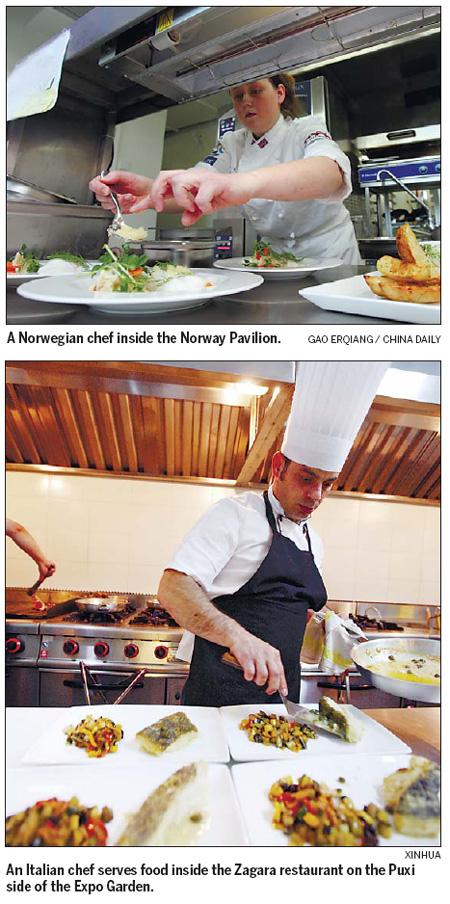
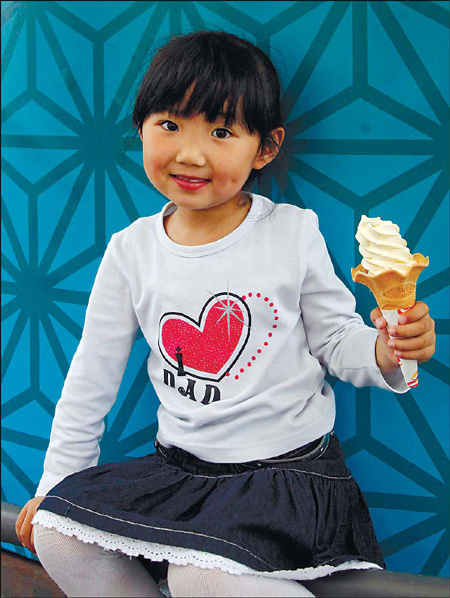 |
| A girl with a Kikkoman soy sauce-flavored icecream at the Japan Corporate Pavilion. |
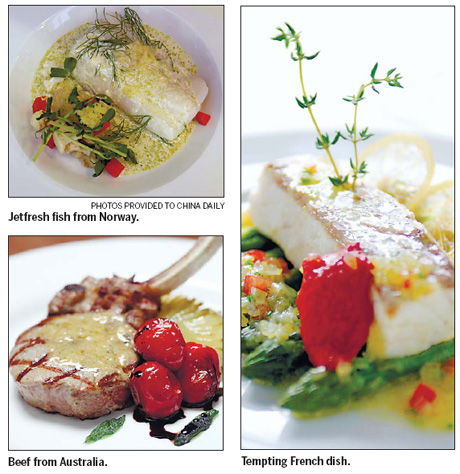
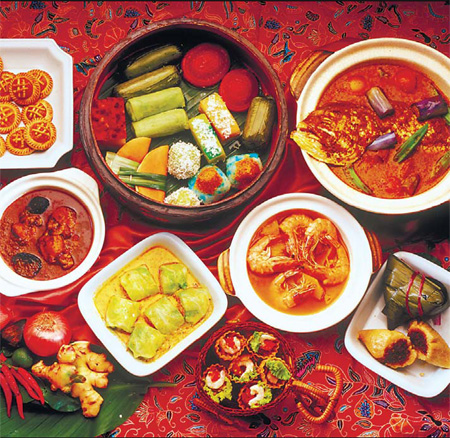 |
| Some Singaporean taste tempters. |
 0
0 






